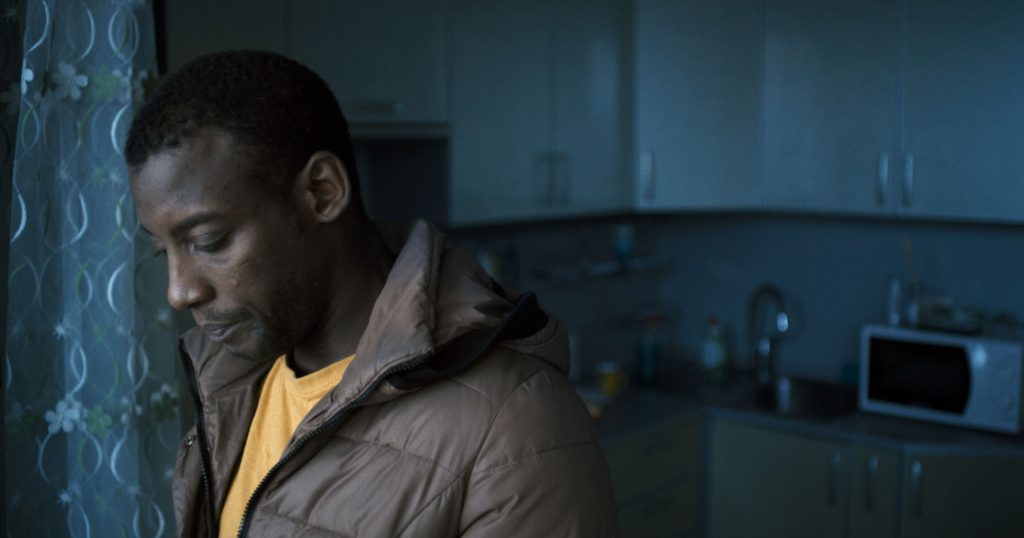Jonathan Ali talks to Cuban filmmaker Luis Alejandro Yero about his film Calls from Moscow
In 2020, the Cuban filmmaker Luis Alejandro Yero found himself stranded in his Havana apartment, confined like the rest of the world due to the pandemic. Some weeks later, he read an article in a foreign newspaper about the difficulties of Cuban refugees stranded in Moscow.
Deeply moved by their plight, Yero spent 18 months researching their situation, getting to know some of them online before he was able to fly to Russia to film there. Arriving in the freezing Moscow winter, Yero and his compatriots soon found themselves facing another challenge: the possible invasion of Ukraine.
Shot in a specially rented apartment, Calls from Moscow fabricates a space where four Cuban men — like the filmmaker, all young and queer — recreate some semblance of what their lives as undocumented migrants is like.
For Dariel, Darryl, Eldis and Juan Carlos, this means much solitude, and time spent on their phones connecting with relatives back in Cuba. Yet it also means a measure of freedom to express themselves creatively and imagine what a future beyond their precarious present might be like. Jonathan Ali spoke with Luis Alejandro Yero about his timely and compassionate film.
The film is very intimate; you achieve a remarkable proximity to your subjects.
Several common elements made complicity very easy. This kind of fraternity arose immediately because we had similar ages. Also, a common origin in Cuba. At the same time, we are all queer. So, the idea was to create a space where we could, above all, play amid that hostility: during the Moscow winter at minus 20 degrees, amid the panic with COVID or crossing paths with the Russian police in the street, amid the alarms about a possible invasion of Ukraine by Putin. Filming became a form of resistance, a way of feeling a vitality between all that desolation.
You forewent having your subjects provide traditional testimonies about themselves.
Yes, completely. The interview is a cinematographic approach that very few filmmakers know how to work in a valuable and surprising manner. In my case, I have always preferred to observe. Although those who are filmed are aware of the camera, I believe that through careful observation, one can find inconsistencies, paradoxes, or the most profound revelations. Also, when you observe someone’s gestures, there is more freedom to make your idea of who that person is. This requires more attention, and more effort to read and discover someone’s deep truth.
In addition to hearing your voice on calls with your subjects, you also appear in the film. Why was it necessary to put yourself in front of the camera?
I have always been very shy about putting myself in front of the camera, mainly because there is not much to say or show about myself. In Calls from Moscow, creating the dispositif of the fake home brought the need to make myself a character in the narrative. It would be a scam if we had hidden that the house doesn’t belong to the protagonists. The place was created by us. However borderline the genre of the film may be, I am always clear when I start and work from a documentary gesture, which is the case here.
One of the subjects returns to Cuba at the film’s end, but it is implied that he has an unknown fate. Were you finally able to contact him? Have you kept contact with the others?
Unfortunately, to this day we haven’t been able to contact Daryl. I talk to the rest of the guys regularly. Eldis returned to Cuba a couple of months after the shooting; Dariel and Juan Carlos are still in Russia. Their situation has certainly not improved much. Informal jobs come and go, allowing them to live with minimal security. They are still in their 20s, they are young, and — for the moment — their vitality allows them to cope with the harshness of their irregular migratory status. They always tell me how they prefer the harshness of life in Moscow to the tedium and collapse of Cuba. Of course, there is nothing ideal about this situation.
Calls from Moscow (2023)
Director: Luis Alejandro Yero
Cuba
66 minutes

